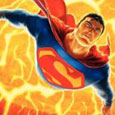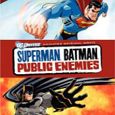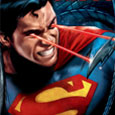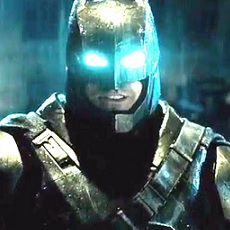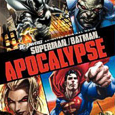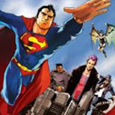Warner Bros. (2011), Warner Home Video (February 22, 2011), Blu-ray + DVD, 76 mins plus supplements, 16:9 ratio, DTS HD Master Audio, Rated PG, Retail: $24.98
Storyboard:
Lex Luthor believes he has triumphed over Superman at long last; but as Superman faces his last days we see just how powerful this legend really is.
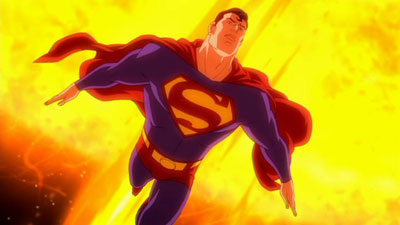
The Sweatbox Review:
Grant Morrison has been called a “comics god,” a visionary, and even a madman. His writing is nothing if not distinctive, encompassing a vast array of stories that range from brilliant to… well, frankly, confusing. Above all, he is almost always interesting. His editors don’t seem to know what to make of him sometimes, giving him a lot of leeway to explore his ideas, perhaps afraid to call him out when he goes too far. Does one dare question a genius? His work on Animal Man is considered somewhat legendary. His Doom Patrol was an intellectual’s delight. Non-superhero titles like The Invisibles and We3 have been widely praised. His revitalization of the JLA comic book was a best-seller, with often amazing stories that were nevertheless incoherent at times. Fans are largely divided about much of his other work, ranging from New X-Men to his more recent work on Final Crisis and Batman, which many found rambling and incomprehensible. Still, others loved these books and heaped more praise on Morrison— the mad god of comics.
There is one recent work of his, though, which received near-unanimous praise. All-Star Superman grew out of his discussions with three other comics writers who years ago pitched a plan to DC Comics for a revamping of the Superman line of books. That pitch was not given the green light, but Morrison continued his own consideration of the character (as did Mark Waid, who came up with Superman: Birthright, a story often overlooked but also having gained in respect over the years). Morrison’s thoughts crystallized in a chance meeting with a man outside of the San Diego Comic-Con in 2003. The man was wearing a Superman costume, and Morrison decided to interview him, considering it an almost shaman-like experience. Morrison was particularly taken with the man’s easy nature, and it struck Morrison that Superman— being immensely powerful— would not be the posing show-off so often portrayed; Superman would quite likely be the most relaxed dude on the planet. After all, if nothing can hurt you, then why stress?
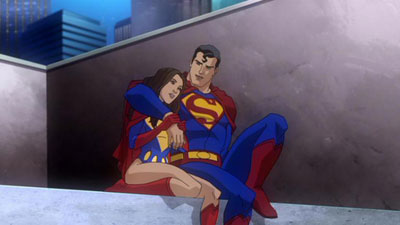
So began Morrison’s conception for Superman. Morrison worked up his own sketches and ideas before beginning to collaborate with fellow Scot Frank Quitely, bringing their own flavor to the American icon. The result was a striking use of old concepts “revitalized for a new age,” to quote any number of reviews. Morrison’s Superman celebrated the brilliant loopiness of the Silver Age Superman, who in the 1950s and 1960s saw the most fanciful exploration of his world, populating it with rich concepts such as fellow Kryptonians, Superman robots, various colors of Kryptonite (and sunlight), a super dog, super Lois Lane, and more. Much of this had been laid to rest in the 1980s Superman revamp by John Byrne (oddly enough, Byrne himself was born British before moving to Canada as a child). The purpose of the Byrne revamp had been to modernize Superman, which in the 1980s meant to remove fancifulness and replace it with scientific rationale. This is not a slight against Byrne; at the time, Superman’s sales had been slipping, and DC was desperate to do something new with the character to come out after their country-wide crossover Crisis On Infinite Earths. In retrospect, though, some of the magic had been lost. In fact, it only took a few years for many of the old concepts to be brought back, some by Byrne himself, though at first writers seemed too embarrassed to truly embrace the quirkiness of the old ideas.
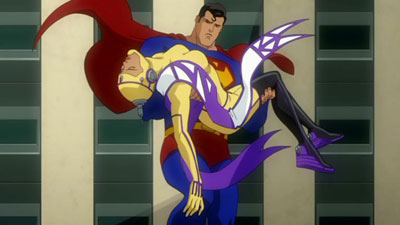
Morrison, though, loves the old ideas. His attitude is to use them as if an editor were suggesting them to him now, and he runs with it in his own way. Morrison is gifted with an immense imagination, too; so the old ideas still manage to come out fresh, with a brightness that belies their musty origins. Meanwhile, Quitely provided an image of Superman that seemed immediately iconic, yet was removed from the old ways of portraying him. The first issue of All-Star Superman depicts him sitting in the clouds, somewhat slumped and fully relaxed, looking over his shoulder at the reader, inviting the reader to enter his world. Inside is a Clark Kent distinctly different than Superman— slouched, awkward, and clumsy. And this time, the super robots and super girlfriend have new designs that are still certainly comic book-y, but definitely different than what came before. The resulting storyline earned Morrison and Quitely comics’ highest honors— with two Eisners, two Harveys, and three Eagle awards to its credit.
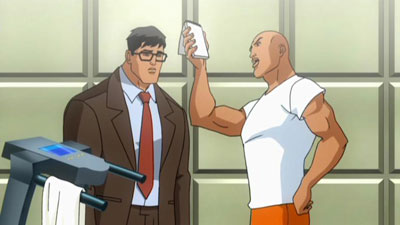
With so much praise, it became a natural for an animated adaptation within the DC Universe animated movie line (thankfully reversing a trend of adapting storylines that sold well but had questionable merit). On the other hand, the structure of All-Star Superman also made it a poor candidate for a movie. In the past, executive producer Bruce Timm has said that a storyline such as Jeph Loeb’s Batman: Hush would not make for a good movie, because it was too episodic, being more suited to a periodical comic book. The same could be said of All-Star Superman, but of course the difference is in the quality of the story told. Still, it would be a tough script to manage. Fortunately, Timm had a colleague up to that challenge. Dwayne McDuffie wrote a script that incorporated as many elements as possible into a 76-minute movie while still striving to maintain a film-like narrative.
To be honest, I don’t think McDuffie was entirely successful, but he did as well as anyone could, given the material. The important thing is that the tone of the comic is nearly perfectly captured, which is the point in a project such as this. Most of the ideas and designs are translated faithfully, with the same strengths and weaknesses as Morrison’s tale. The big ideas are there, teasing our imagination with such concepts as a baby sun-eater and time-travelling demigods. In the comic, each chapter made for a great issue, but watching them spill out in a film is a similar experience to reading the collected edition—a sense of watching episodes rather than experiencing a total film. Still, McDuffie did pretty well to form it into a complete story, even if he had to deal with some of Morrison’s typical traits as a storyteller.
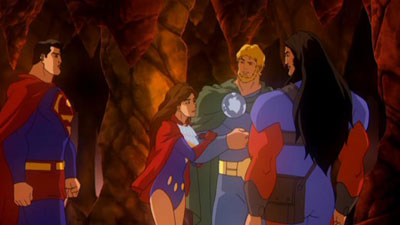
This story is largely about the death of Superman, which has always kept me from fully enjoying it. This is a Superman who has already had an unbelievably rich life, only to be made the victim of a bold plan by Lex Luthor. In the plot, Luthor is also at the end of his life as a supervillain. He has already failed numerous times in his quest to kill Superman, and is permanently incarcerated and awaiting execution. However, the U.S. government has given him some freedom— just enough to provide them with a steady stream of inventions to benefit mankind, or at least the American military. Of course, Luthor should not be trusted, and he uses his bit of freedom to connive a plan to get rid of Superman once and for all.
As the film opens, glimpses of Superman’s origin unfold as he races to the sun to save an experimental spaceship piloted by super-genius Dr. Leo Quintum. Superman is successful, but Luthor’s sabotage plan works and Superman is exposed to a fatal dose of solar energy. Superman gains new powers, and his existing powers are magnified. The drawback is that his cellular structure cannot contain the energy forever, and he will eventually decompose. Between the new insights gained by expanded intellect and perception, and the prospect of death, Superman finally decides to spend some quality time with Lois, revealing to her all of his secrets at his Fortress Of Solitude before giving her temporary superpowers— the ultimate way to allow her to share in his world. They go on to encounter Atlas and Hercules, two mischievous time travellers attempting to woo Lois and possibly harm Superman. Later, Superman meets two Kryptonian scientists, Clark Kent interviews Luthor in prison (where all sorts of calamity ensues), and the rest of Luthor’s master plan is revealed when he cheats the electric chair. As Superman’s time on Earth draws to a close, he will get a final chance to either defeat of redeem his arch nemesis, and save the Earth; and a new legacy is revealed.
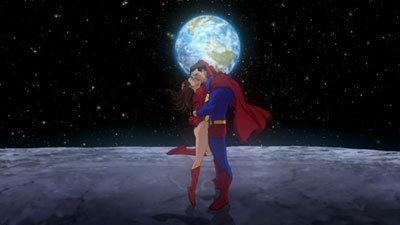
And somewhere in there, the viewer’s head explodes… in a good way. With the time constraints McDuffie had, he had to drop many of the storylines from the comic, so that we do not get to meet Bizarro, Doomsday, future Supermans (except for a brief moment) or a suicidal girl (McDuffie’s greatest regret, he said in interviews). Some of the richness of the story is therefore left behind, but anyone who never read the story will not miss those moments. There are still ample amounts of greatness, though, in the movie. Hopefully, the movie will encourage more people to pick up the collected editions of the comic, because there is so much there to love.
If either the comic or the movie has a weakness, it’s the revelation of another player near the end of the story, an accomplice of Luthor’s. Morrison has a habit of throwing concepts out spontaneously, and though you can tell it was all plotted ahead of time, one sometimes wishes that everything could have flowed a little better. Foreshadowing is certainly not a foreign concept for Morrison, but the way he uses it can be too oblique; in other cases, revelations can seem to come totally out of nowhere. His comics reward multiple readings, so those that don’t afford his stories that opportunity can be left confused and disappointed, wondering what all the fuss was about. Fortunately, All-Star Superman is one of his works that overcomes that issue, and the movie reflects the awesomeness of the comic storyline, albeit without some of its plot points.
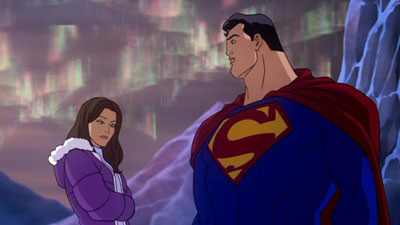
The quality of the story aside, I don’t find Morrison’s Superman to be my Superman. Although I did grow up reading reprints of the Silver Age stores, and do enjoy them, I don’t relate all that well with Morrison’s aloof Superman who lives a life well beyond those of the humans. Morrison and Quitely’s Superman is too stiff, and too much of an outsider for my taste, a taste heavily influenced by Curt Swan’s drawings (where Superman often looked relaxed but not aloof) and Christopher Reeve’s humanistic portrayal in the films. The Superman seen in All-Star was one I couldn’t fully connect with, even though I was amazed by his adventures.
As far as the animation is concerned, it is necessarily toned down for a lot of the movie to go along with the often-introspective tone; but when there’s action to be had, the animation keeps up just fine. Character designs are generally true to what Quitely did in the comic, though his Superman wasn’t so “lippy” in print. (And the same goes for Luthor and the other male characters; what’s with the lips?) Clark is oafish and tousle-haired, Jimmy is oddly lanky, and Lois shows too much skin. And of course, lines are all-around smoother; Quitely’s wrinkle-ness wouldn’t translate well to animation on a budget.
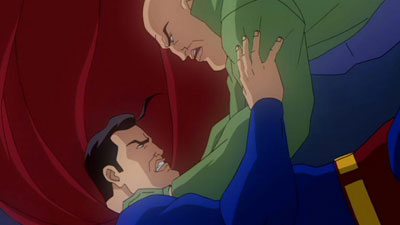
James Denton (Desperate Housewives) does his best to provide Superman with a rugged, matter-of-fact voice. I only wish he’d been written and drawn with more of a sense of humor. Apparently, Clark must be a buffoon to make up for Superman being so humourless. He may be laid back, but a smile once in a while would be nice, too. Christina Hendricks (Mad Men) does well also as Lois, though both she and Denton suffer a bit from sounding like they’re reading lines (maybe it’s the stiff animation). Meanwhile, someone finally clued in that the perfect Perry White would be “Lou Grant” himself, Ed Asner. Anthony LaPaglia does a great, growling Luthor, cunning yet menacing in every line.
All-Star Superman is a celebration of what made those classic Silver Age stories great: gutsy imagination and fearless invention. In writing All-Star Superman, Morrison’s stated intention was to provide the readership with a run of fantastic Superman stories for the ages. He certainly succeeded. For the film, McDuffie did a fine job at capturing what Morrison was going for, while thinning it down into a manageable film. Sadly, McDuffie passed away much, much too young, just as the movie was coming on sale. The only decent thing to come out of his passing is that his final work was so masterful, providing a fitting tribute to the talent that also did so much to create one of the finest TV cartoons ever, Justice League Unlimited, not to mention the Milestone comics characters, partially realized in the TV show Static Shock.
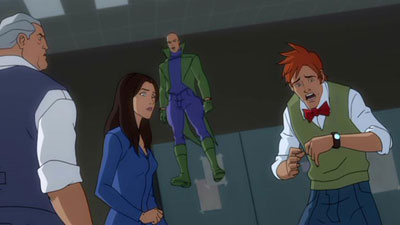
My experience with the movie version is very similar to what I felt with the comic. Once I watched it, I wanted to watch it again. And, like the comic, it is better the second time. I expect it will be even better the third time. As with much of what Morrison does, he and the reader get so caught up in the big ideas that you can miss the details (if he remembers to put them in). Small things suddenly take on immense importance, and once you put it all together, it can be surprising how much it affects you. I was mildly disappointed in this film on my first viewing, but re-watching it later I was quite taken by the understated emotion that swelled to a great conclusion, a conclusion that I previously found cold and even a little sad. I may just be slow, but it was my second viewing that convinced me that this is a special story, with not only boundless imagination, but also a super heart. Bravo.
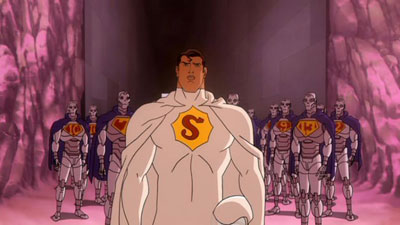
Is This Thing Loaded?
Sadly, there is no DC Showcase short this time around, but we still otherwise get one of the best suites of bonuses we’ve seen from this movie series in a while. Though we don’t get much about the making of the film itself, the features that are present provide a great supplement for readers of the comic especially. Before getting to the good stuff, the disc naturally opens with some Trailers, including those for last year’s Harry Potter film, Superman/Batman: Apocalypse, and DC Universe Online. A quick trailer for Batman: Under The Red Hood is also on the disc, accessed through the menu system.
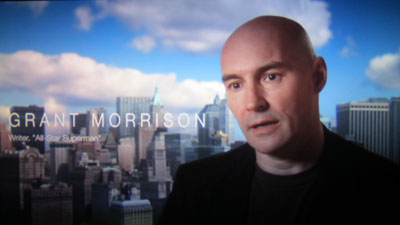
In terms of the movie, we do get an Audio Commentary featuring Grant Morrison and executive producer Bruce Timm. It’s a solid track, discussing the origins of the comic, Morrison’s inspirations, his vision for the character, and the difficulties involved in adapting it to film. Superman Now (33:48) was the original name for Morrison’s pitch, and it provides the name for the first featurette as well. Morrison and DC executive Dan Didio recall how the pitch came about, and how the comic was shaped. Quitely is acknowledged, but this is pretty much Morrison’s show. (Unfortunately, Quitely does not appear on camera in any of the material on the disc.) After glimpsing Morrison’s inspirational sketches in the first featurette, the next featurette gives us a closer look. The Creative Flow: Incubating The Idea With Grant Morrison (9:36) has Morrison showing off and discussing these sketches that he made while his ideas were coalescing.
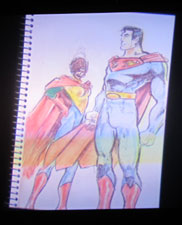
For those that have not seen the comic, there is an onscreen version of All-Star Superman #1, so you can compare how well the film realized Morrison and Quitely’s vision, at least for the first chapter. Bruce Timm’s Picks this time around are two episodes from Superman: The Animated Series: the two-part Blasts From The Past, where Superman meets two fugitive Kryptonians.
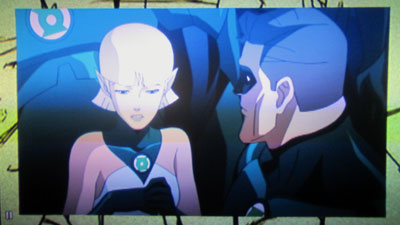
There are two Sneak Peek featurettes. One is for the already released Superman/Batman: Apocalypse (12:12), but the other is the Green Lantern: Emerald Knights Sneak Peek (11:45). The directors appear onscreen, as do some of the voice actors, and… actual animation footage! This one is due to be released in time for the big live action film coming to theaters in Summer 2011.
The DVD copy in this set gives just the WB logo promo, then goes straight to the menu. There are no special features on the combo pack DVD, other than a digital copy of the movie for portable devices.
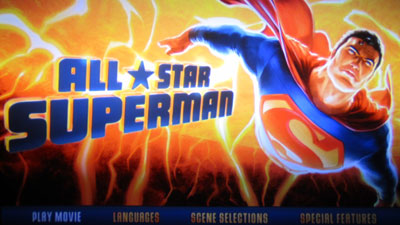
Case Study:
The Blu-ray eco case has a disc on each side of the interior, plus inserts to help you unlock the digital copy as well as advertise DC Universe Online. The embossed foil slipcover is one of the nicer ones I’ve seen, really giving you the sense that Superman is flying out of an intense sun.
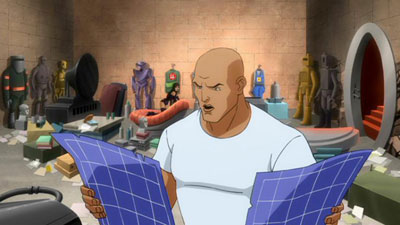
Ink And Paint:
The Blu-ray offers about as perfect a 1080p image as you could hope for. Colors are bright and stable. Instances of aliasing or banding are so minor that you have to be looking for them, at least according to my 51” screen. The Blu-ray certainly handles color intensity better than the DVD, though the DVD itself is fine for standard definition.

Scratch Tracks:
While most of the sound mix is front heavy, the surrounds are at least quite engaged. The audio becomes much more impressive during action sequences, which are peppered throughout the film. Here, the true force of the soundtrack can be measured. I was more impressed once I put the volume up a bit, as I could then feel the bass come alive, from the pulsing soundtrack to the rattling of superhuman fights. Dolby Digital 5.1 tracks are also offered in French, Spanish, German, and Portuguese. Subtitle options are in English, German, Portuguese, and Spanish.
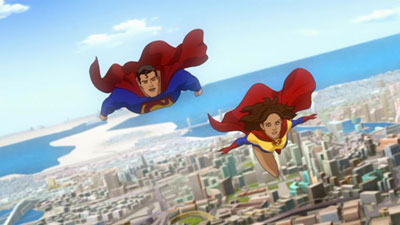
The DVD offers Dolby Digital 5.1 audio, and English subtitles (for the hearing impaired).
Final Cut:
A great comic becomes a great film. Like the comic, it failed to connect with me emotionally at first, though I was swept up in the ideas. A second viewing showed me the heart I hadn’t realized was present the first time around. Nice video and audio, and some perfect bonus features make up a great package. This isn’t my favorite Superman, but that doesn’t mean it’s not a darn special story.
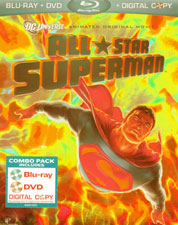 | ||
 |



